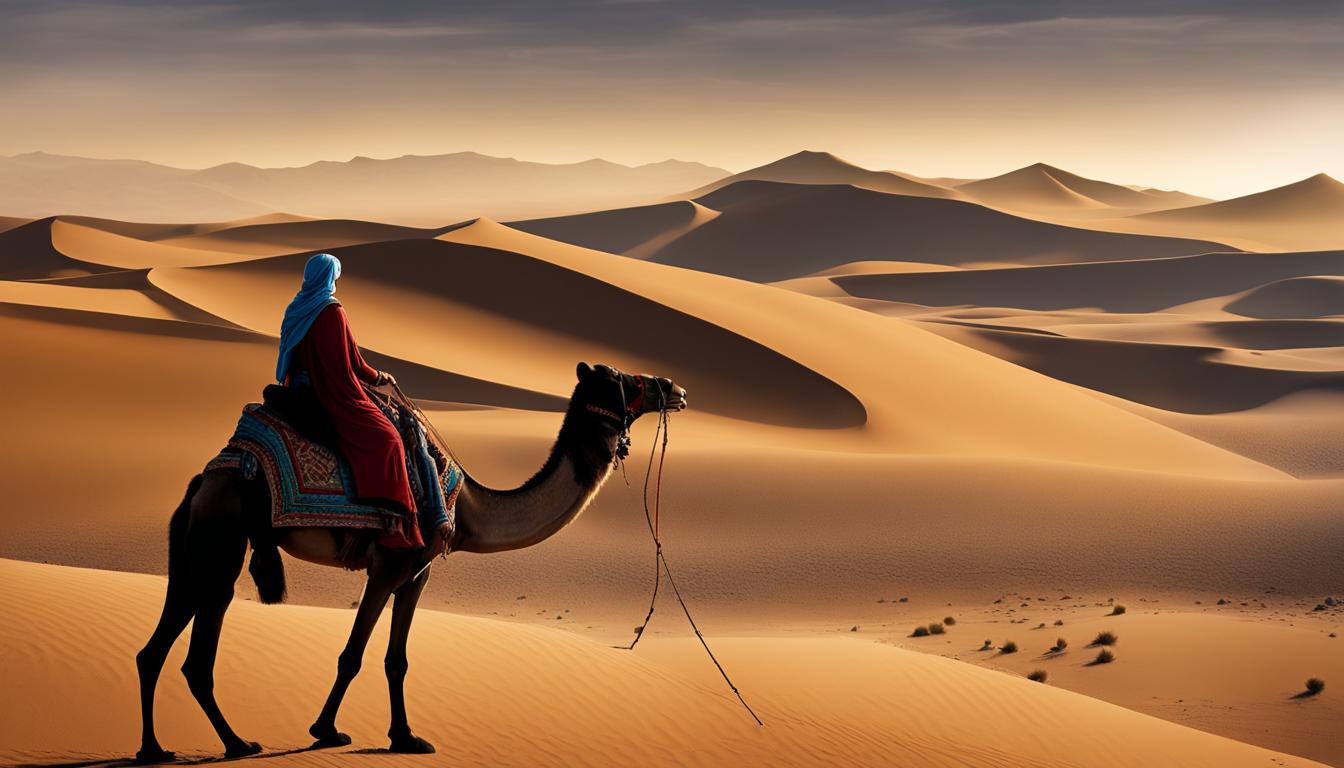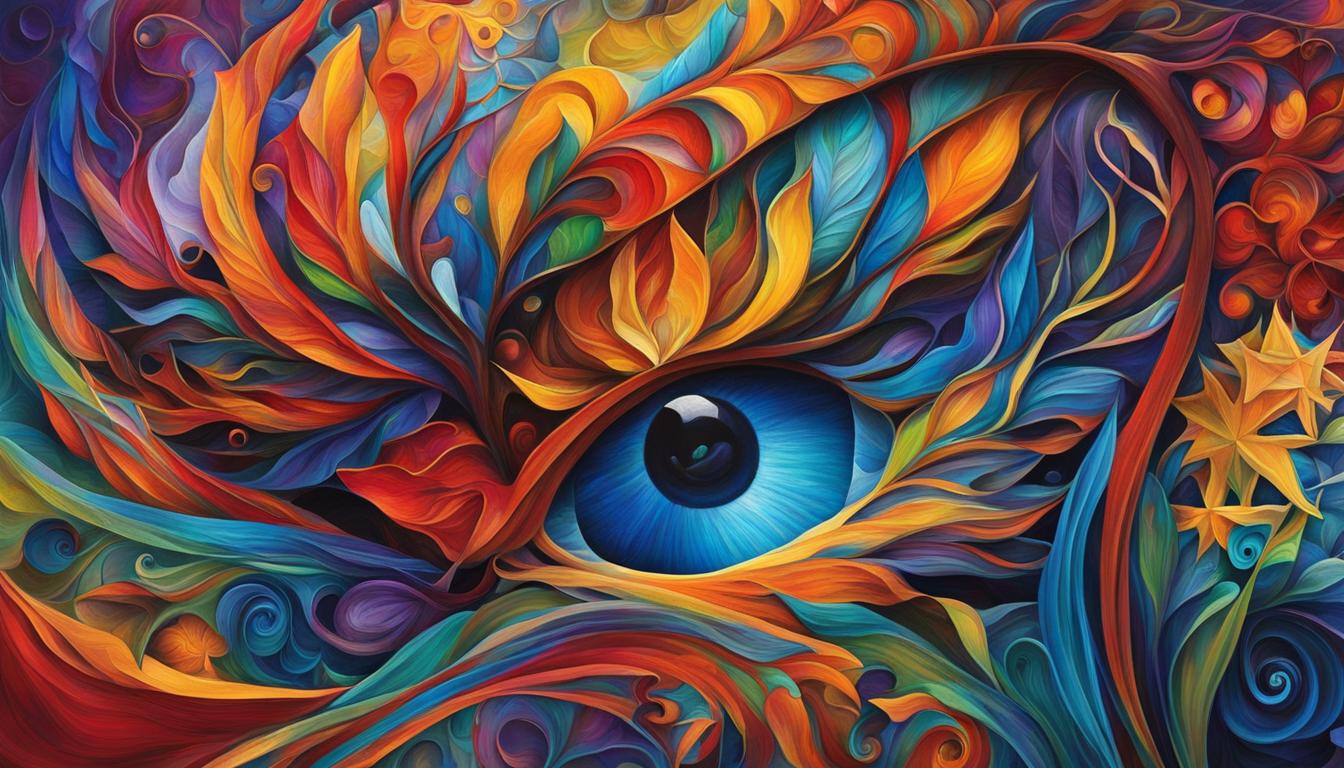Have you ever had a dream about a camel? If so, you may be wondering what this intriguing symbol could mean. Dreams play a significant role in our subconscious mind, providing insights into our thoughts, emotions, and desires. Dreams about camels are no exception, holding deep symbolic meanings and spiritual significance.
Camels have long been associated with resilience, strength, and determination. In various cultures, they represent the journey of life and the challenges we face along the way. Understanding the meaning behind a dream about a camel can offer valuable insights into our own spiritual journey and personal growth.
Key Takeaways:
- Camels in dreams hold deep symbolic meanings and spiritual significance.
- They represent resilience, strength, and determination.
- Understanding the meaning behind a dream about a camel can provide insights into our spiritual journey and personal growth.
- Dreams about camels often symbolize the challenges we face in life and the need for perseverance.
- Interpreting the positions, colors, and actions of the camel in dreams can further enhance our understanding of the dream’s message.
Historical and Cultural Significance of Camel Dreams
In order to fully understand the meaning of a dream about a camel, it is important to explore its historical and cultural significance. Throughout history, dreams have been seen as a window into the spiritual realm, offering guidance and insights into our lives. In ancient Egyptian mythology, camels were closely associated with dreams and were believed to represent the journey towards enlightenment. The Bedouin tribes saw the camel as a symbol of endurance and the journey of life. In Islamic tradition, dreaming of a camel is considered a sign of good luck and success. The Hindu tradition views the camel as a representation of spiritual growth, while in Chinese culture, it is associated with strength and good fortune.
Camels hold deep symbolic meanings in these various cultures, embodying qualities such as resilience, strength, and determination. Dreaming of a camel can indicate our own spiritual journey and personal growth. It can symbolize the need to stay true to oneself and persevere through challenges. Understanding the historical and cultural context of camel dreams can provide valuable insights into the significance they hold.
Ancient Egyptian Mythology: The Journey Towards Enlightenment
“In ancient Egyptian mythology, camels were believed to represent the journey towards enlightenment. They were associated with the god of dreams and served as a guide through the realm of the subconscious. The camel’s presence in dreams was seen as a sign of divine intervention and spiritual growth.”
Bedouin Tribes: The Journey of Life
“The Bedouin tribes regarded the camel as a symbol of endurance and the journey of life. The camel’s hump represented the process of enlightenment, while its long legs signified the challenges and obstacles that one faces along the way. Dreaming of a camel was seen as a reminder to stay resilient, determined, and true to oneself.”
Islamic Tradition: Good Luck and Success
“In Islamic tradition, dreaming of a camel is considered a sign of good luck and success. It is believed to bring blessings and prosperity to the dreamer’s life. The camel represents resilience, perseverance, and the ability to overcome any obstacle on the path to success.”
Hindu Tradition: Spiritual Growth
“The Hindu tradition sees the camel as a symbol of spiritual growth. Dreaming of a camel can indicate the dreamer’s progress on their spiritual path and their journey towards self-realization. It symbolizes the need to cultivate inner strength, patience, and determination.”
Chinese Culture: Strength and Good Fortune
“In Chinese culture, the camel is associated with strength and good fortune. Dreaming of a camel can signify the dreamer’s resilience and ability to overcome challenges. It is seen as a positive omen that brings good luck and opportunities for success.”
Symbolism of the Camel in Dreams
When it comes to dreams, the camel holds deep symbolic meaning, representing strength, perseverance, and the journey of life. Dreaming of a camel can signify the ability to overcome challenges and the need to stay determined in the face of adversity. It is a powerful symbol of resilience and patience.
Furthermore, the camel is often associated with wealth and success. Seeing a camel in a dream can be a sign that financial abundance and prosperity are on the horizon. It reminds us to stay focused on our goals and to work hard towards achieving them.
A dream about a camel can also indicate a sense of protection. It suggests that the dreamer is being shielded from harm and guided towards a safe path. It is a reminder to trust in one’s own intuition and inner strength.
Dream Symbols and their Meanings
| Dream Symbol | Meaning |
|---|---|
| Strength | The camel represents resilience and the ability to endure challenging situations. |
| Perseverance | Dreaming of a camel signifies the need to stay determined and committed to one’s goals. |
| Journey | The camel symbolizes a journey, whether it is a spiritual, physical, or life journey. |
| Wealth | Seeing a camel in a dream can be a sign of financial abundance and success. |
| Protection | A dream about a camel suggests that the dreamer is being guided and protected. |
Dreaming of a camel can bring forth powerful messages about resilience, perseverance, and the journey of life. It is a symbol of strength, wealth, and protection. When we dream of camels, we are reminded to stay determined, work hard towards our goals, and trust in our own inner strength. These dreams can offer guidance and insights into our waking lives, encouraging us to stay true to ourselves and navigate challenges with resilience.
The Spiritual Meaning of the Camel in Dreams
When it comes to dream interpretation, understanding the symbolism behind the images we encounter can provide profound insights into our subconscious and spiritual journey. Dreaming of a camel holds great spiritual meaning, representing qualities such as patience, inner strength, and spiritual growth.
The camel’s symbolism in dreams is closely tied to its real-life characteristics. Just like the camel’s ability to endure long journeys in harsh desert environments, dreaming of a camel signifies our own resilience and ability to navigate through challenging times. It serves as a reminder to stay patient and steadfast on our chosen spiritual path.
Furthermore, dreaming of a camel can also symbolize abundance and a deeper connection to the divine. Like the camel’s ability to carry heavy loads, this dream may indicate that we have the strength and resources to manifest our desires and attract prosperity into our lives.
“Dreaming of a camel signifies our own resilience and ability to navigate through challenging times.”
Overall, dreaming of a camel holds significant spiritual meaning. It encourages us to tap into our inner strength, embrace patience, and stay committed to our spiritual growth. By paying attention to the messages conveyed in our dreams, we can gain valuable insights and guidance for our waking lives.
Positions of the Camel in Dreams
Dreams about camels often involve various positions that the camel takes, each with its own significance and interpretation. Understanding the positions of the camel in dreams can provide a deeper understanding of the messages and guidance that the dream is trying to convey.
Standing Camel
A standing camel represents stability, security, and a sense of groundedness in your waking life. It signifies that you have a strong foundation and are able to handle challenges with resilience. This position of the camel in dreams indicates that you have a solid support system and the resources necessary to overcome obstacles.
Walking Camel
When the camel is walking or trotting in a dream, it symbolizes progress and a journey. It represents the ongoing process of personal growth and development. This position indicates that you are actively moving forward in your life, taking steps towards your goals and aspirations. Dreaming of a walking camel emphasizes the importance of perseverance and determination in the face of challenges.
Camel on a Journey
If the camel is depicted on a journey in your dream, it signifies that you are embarking on a significant life journey. This journey could be physical, emotional, or spiritual in nature. It highlights the need for you to stay determined and focused on reaching your destination. Dreaming of a camel on a journey is a reminder to trust in your abilities and have faith in the process.
Stationary Camel
A stationary camel in a dream suggests the need for reflection and reassessment. It signifies a pause or a moment of stillness in your life. This position of the camel indicates that you may need to take some time to evaluate your current situation and make sure you are on the right path. It’s a reminder to slow down, reflect, and make any necessary adjustments before moving forward.
The presence of a camel in any position in your dreams is also a symbol of protection. It represents a guiding force or higher power that is watching over you and keeping you safe from harm.
| Position of the Camel | Meaning |
|---|---|
| Standing Camel | Stability, security, groundedness |
| Walking Camel | Progress, journey, perseverance |
| Camel on a Journey | Embarking on a significant life journey |
| Stationary Camel | Reflection, reassessment, pause |
| Presence of a Camel | Protection, guidance, higher power |
Colors of the Camel in Dreams
The colors of the camel in dreams hold deep symbolic meaning, providing additional insight into the dreamer’s subconscious. Different colors convey various emotions and messages within the dream realm. Let’s explore the significance of white, black, brown, grey, and yellow camels in dreams.
| Camel Color | Symbolic Meaning |
|---|---|
| White Camels | Represent peace, spirituality, and purity. They indicate a harmonious and serene state of mind. |
| Black Camels | Can symbolize death, destruction, or bad luck. They often reflect hidden fears or negative emotions within the dreamer. |
| Brown Camels | Associated with stability, hard work, and reliability. They represent perseverance and the need to stay grounded. |
| Grey Camels | Signify doubt and uncertainty. They suggest that the dreamer may be facing indecision or confusion in their waking life. |
| Yellow Camels | Represent joy, optimism, and new opportunities. They symbolize positivity, happiness, and a bright future ahead. |
Emphasizing the colors of the camel in dreams allows for a deeper understanding of the dreamer’s current life situation. By analyzing the color symbolism, we can gain valuable insights into our emotions, challenges, and personal growth.
Let’s not forget that dream interpretation is highly personal, and one’s cultural background and individual experiences can influence the interpretation of colors in dreams. So take a moment to reflect on how these colors resonate with you personally and consider the context of the dream as a whole.
Color Associations in Camel Dreams
When interpreting the colors of the camel in dreams, it’s essential to take into account the broader symbolism associated with each color. For example, white camels often align with purity and spirituality, indicating a need for inner peace and divine connection. Meanwhile, black camels may indicate the presence of underlying fears or negative emotions that need to be addressed and transformed.
Brown camels symbolize stability and reliability, reminding the dreamer of the importance of hard work and perseverance. Grey camels suggest a time of uncertainty or doubt, calling for reflection and reassessment. Finally, yellow camels represent joy, optimism, and new opportunities, signaling a period of positive change and growth.
Keep in mind that the interpretation of colors in dreams should consider the dreamer’s personal associations and cultural background. While general symbolism can provide insights, it is the individual’s unique experiences and beliefs that ultimately shape the meaning behind the colors of the camel in their dreams.
In conclusion, the colors of the camel in dreams carry significant symbolic meaning. Understanding the symbolism behind each color can provide valuable insights into the dreamer’s emotions, challenges, and personal growth. By analyzing these colors within the context of the dream and considering personal associations, we can gain a deeper understanding of ourselves and the messages that our dreams convey.
Actions of the Camel in Dreams
When it comes to understanding the meaning of our dreams, it’s important to pay attention to the actions of the camel. These actions hold symbolic significance and can provide valuable insights into our waking lives. Dreaming of a camel embarking on a journey represents our own personal journey, reminding us of the importance of perseverance and patience. It serves as a powerful reminder to stay determined and focused on our goals.
A dream featuring a camel can also be a sign of good luck and protection. The camel’s presence in our dreams serves as a guardian, guiding us through challenging situations and shielding us from harm. This symbol of protection reassures us that we are not alone and that we have the strength and support needed to overcome any obstacles we may face.
Just as in real life, the actions of the camel in our dreams can have a profound impact on our journey. By paying attention to the actions and behaviors of the camel in our dreams, we can gain deeper insights into our own thoughts, emotions, and desires. This self-awareness allows us to make informed decisions and take meaningful actions in our waking lives.
Dream Journal Entry
“In my dream, I saw a camel walking steadily through the desert. It never wavered or faltered, despite the harsh terrain. I felt a sense of calm and reassurance as I watched it navigate the challenging landscape. The camel’s unwavering determination reminded me to stay focused on my own journey and to persevere through difficulties. I woke up with a renewed sense of strength and an understanding that I have the resilience to overcome any challenges that come my way.”
| Action | Symbolic Meaning |
|---|---|
| Embarking on a journey | Represents our personal journey and emphasizes the importance of perseverance and patience. |
| Sign of good luck and protection | Indicates that we are being guided and shielded from harm in our waking lives. |
| Walking steadily | Symbolizes resilience and serves as a reminder to stay determined and focused on our goals. |
Overall, the actions of the camel in our dreams act as powerful symbols that can provide guidance and reassurance. By paying attention to these actions, we can tap into our inner strength and navigate our own personal journey with perseverance, patience, and the knowledge that we are protected along the way.
Understanding Dreams and Their Meanings
When it comes to understanding dreams, there is a fascinating world to explore. Dream interpretation allows us to delve into the depths of our subconscious mind and unravel the hidden meanings behind our nocturnal experiences. By analyzing the symbols, emotions, and scenarios that occur in our dreams, we can gain valuable insights into our deepest desires, fears, and unresolved emotions.
Dreams are like a window into our inner world, offering glimpses of our true selves. They can provide guidance, inspiration, and even warnings. To interpret dreams effectively, it is important to consider various psychological theories and cultural factors. Dreams are highly personal, influenced by our unique experiences and cultural backgrounds. By acknowledging these factors, we can gain a more accurate understanding of the messages our dreams are trying to convey.
In dream interpretation, there are no hard and fast rules. It is a subjective and intuitive process that requires careful analysis and reflection. Some common symbols and themes may have universally accepted meanings, while others may have personal significance to the dreamer. By embracing our curiosity and exploring the rich tapestry of our dreams, we can unlock a world of self-discovery and personal growth.
Psychological Theories and Cultural Factors in Dream Interpretation
Psychologists, such as Sigmund Freud and Carl Jung, have played a significant role in shaping our understanding of dreams. Freud believed that dreams are a reflection of our unconscious desires and thoughts, while Jung introduced the concept of the collective unconscious, which influences the symbols and archetypes that appear in our dreams.
| Psychological Theories | Cultural Factors |
|---|---|
| Freud’s theory of unconscious desires | Symbolism and associations specific to different cultures |
| Jung’s concept of the collective unconscious | Beliefs, traditions, and superstitions related to dreams in different societies |
| Analysis of symbols, emotions, and scenarios | Personal experiences and cultural background of the dreamer |
Understanding dreams requires taking into account these psychological theories and cultural factors, as they provide valuable insights into the meaning of our dreams. By combining our own personal associations and experiences with these broader frameworks, we can embark on a journey of self-discovery and gain a deeper understanding of ourselves and our place in the world.
The Science Behind Dream Interpretation
Understanding the science behind dream interpretation involves delving into the theories put forth by renowned psychologists such as Sigmund Freud and Carl Jung. These pioneers in the field believed that dreams are windows into our unconscious desires and the deeper aspects of our psyche.
Sigmund Freud proposed that dreams are a manifestation of our repressed thoughts and wishes. According to his theory, the content of dreams is symbolic and often represents unconscious desires that we may not be aware of in our waking life. Freud believed that analyzing these symbols and the underlying meaning behind them can provide valuable insights into our psychological state and personal experiences.
“Dreams are the royal road to the unconscious.”
– Sigmund Freud
Carl Jung expanded on Freud’s work and introduced the concept of the collective unconscious. He believed that dreams not only reflect our personal experiences but also tap into the collective knowledge and wisdom of humanity. Jung emphasized the importance of archetypes and symbols in dream interpretation, suggesting that they hold universal meanings that are shared across cultures and generations.
Unconscious Desires and the Collective Unconscious
The science behind dream interpretation encompasses the exploration of our unconscious desires and the concept of the collective unconscious. By analyzing the symbols, emotions, and patterns within our dreams, we can gain a deeper understanding of ourselves and the hidden aspects of our psyche.
Dream interpretation is a fascinating field that combines psychology, symbolism, and personal experiences. By unraveling the science behind dream interpretation, we can unlock the messages that our dreams hold and gain valuable insights into our inner world.
Cultural Factors in Dream Interpretation
Dream interpretation is a deeply personal and subjective process influenced by various cultural factors. Different societies and belief systems attach unique meanings to symbols and scenarios, shaping the way individuals interpret their dreams. Understanding the cultural context of dream symbolism is essential for accurate interpretation.
Cultural Associations
In dream analysis, cultural associations play a significant role in determining the meaning of specific symbols. For example, in Western cultures, a black cat is often associated with bad luck or witchcraft, while in other cultures, it may symbolize protection or good fortune. Similarly, dreaming of a white dove may represent peace and purity in many cultures, while in some Asian cultures, it signifies death.
By considering the cultural associations that have been ingrained in our subconscious, we can gain a deeper understanding of the symbolism in our dreams. It allows us to decipher the messages our dreams are trying to convey.
Personal Interpretation
While cultural factors provide a foundation for dream interpretation, personal experiences and beliefs also play a crucial role. Each individual brings their unique perspective to the process, influenced by their upbringing, personal values, and life experiences. What a camel symbolizes to one person may differ from another, based on their personal interpretation of this animal.
It is important to trust our instincts and listen to our inner voice when interpreting our dreams. Our own associations and experiences often hold valuable insights that can help us connect with the deeper meaning behind our dreams.
Conclusion
Dream interpretation is a complex and multifaceted process that incorporates both cultural factors and personal interpretation. By considering the cultural associations of symbols and reflecting on our personal experiences, we can gain a more comprehensive understanding of the messages our dreams are trying to communicate. Remember to approach dream analysis with an open mind and trust your own intuition, as it is ultimately your interpretation that matters most.
Common Huge Camel Dream Scenarios and Their Interpretations
Camel dreams can manifest in various scenarios, each offering a unique interpretation. Exploring these common dream scenarios can provide valuable insights into our personal growth and self-discovery.
Riding a Camel
When you dream of riding a camel, it symbolizes your adaptability and resilience in navigating life’s challenges. Just as a camel can endure long and arduous journeys in the desert, this dream reflects your ability to overcome obstacles and find balance in difficult situations. It serves as a reminder to trust yourself and embrace change with confidence.
Camel in the Desert
A dream featuring a camel in the desert represents the need for self-sufficiency and independence. It signifies your ability to rely on your own inner resources and find strength in solitude. The vastness of the desert reflects the vast possibilities that await you when you embrace self-reliance and explore uncharted territories of personal growth.
Camel Caravan
When you encounter a camel caravan in your dream, it emphasizes the importance of community and collaboration. Just as camels travel together for safety and support, this dream signifies the strength and comfort found in connections with others. It encourages you to seek harmonious relationships and reminds you that you do not have to face challenges alone.
Table: Symbolic Meanings of Common Huge Camel Dream Scenarios
| Dream Scenario | Interpretation |
|---|---|
| Riding a Camel | Adaptability and resilience in navigating challenges |
| Camel in the Desert | Need for self-sufficiency and independence |
| Camel Caravan | Importance of community and collaboration |
By understanding the symbolic meanings behind these common camel dream scenarios, you can gain valuable insights into your personal growth journey. Reflecting on these dreams can guide you towards embracing change, finding inner strength, and fostering meaningful connections with others.
The Impact of Camel Dreams on Your Waking Life
Dreams have a profound impact on our waking lives, and camel dreams are no exception. These dreams offer a unique opportunity for self-discovery and personal growth. By delving into the symbolism and meaning behind camel dreams, we can gain valuable insights and guidance that can shape our lives in a positive way.
Camel dreams provide a window into our deepest desires, fears, and emotions. They can reveal hidden aspects of ourselves and shed light on unresolved issues. By paying attention to the messages conveyed in these dreams, we can better understand ourselves and make informed decisions about our lives.
As we reflect on camel dreams, we embark on a journey of self-exploration. These dreams act as a mirror, reflecting our strengths, weaknesses, and potential for growth. By embracing the lessons and wisdom found in these dreams, we can navigate our waking lives with greater clarity and purpose.
Through the symbolism of camels in our dreams, we receive guidance that can help us overcome challenges and achieve personal growth. These dreams offer us a unique perspective on our spiritual journey and remind us to stay true to ourselves. By listening to the messages of our camel dreams, we can unlock our full potential and lead a more fulfilling life.
FAQ
What does a dream about a camel mean?
Dreams about camels often represent the spiritual and symbolic journey of life. Understanding the meaning behind a dream about a camel can provide insights into our own spiritual journey and personal growth.
What is the historical and cultural significance of camel dreams?
In ancient Egyptian mythology, camels were associated with the god of dreams and represented the journey towards enlightenment. The Bedouin tribes believed that the camel’s hump symbolized the process of enlightenment and its long legs represented the journey of life. In the Islamic tradition, dreaming of a camel is considered a sign of good luck and success. The Hindu tradition sees the camel as a symbol of spiritual growth, while in Chinese culture, it is associated with good fortune and strength.
What is the symbolism of the camel in dreams?
The camel is a powerful symbol in the dream world, often associated with strength, resilience, and patience. It represents a journey, whether it is a spiritual, physical, or life journey. The camel also symbolizes wealth and success. Dreams of a camel can be a sign of protection, indicating that the dreamer is being cared for and shielded from harm.
What is the spiritual meaning of the camel in dreams?
The camel holds great spiritual significance in dreams. It represents patience, inner strength, and the ability to endure challenging situations. Dreaming of a camel may be a sign of spiritual growth and transformation. It can also symbolize abundance and a deeper connection to the divine. The dreamer is encouraged to stay on their chosen spiritual path.
What do the positions of the camel in dreams indicate?
The positions of the camel in dreams provide further insight into the dream’s meaning. A standing camel represents stability and security, while a walking or trotting camel suggests progress and a journey. When the camel is walking up a hill or mountain, it signifies facing a challenge with the determination to overcome it. A stationary camel may indicate a need for reflection and reassessment. The presence of a camel in a dream can also be a sign of protection.
What do the colors of the camel in dreams symbolize?
The colors of the camel in dreams carry symbolic meaning. White camels represent peace, spirituality, and purity. Black camels can symbolize death, destruction, or bad luck. Brown camels are associated with stability, hard work, and reliability. Grey camels signify doubt and uncertainty, while yellow camels represent joy, optimism, and new opportunities. Understanding the colors of the camel in a dream can provide further insight into the dreamer’s current life situation.
What do the actions of the camel in dreams signify?
The actions of the camel in dreams hold symbolic meaning. Dreaming of a camel can represent the dreamer’s own journey and the need for perseverance and patience. It can also be a sign of good luck and protection. The camel’s actions in the dream can provide deeper insight into the dreamer’s current circumstances and emotions.
How do we understand dreams and their meanings?
Dreams are products of the subconscious mind and can provide insights into our deepest desires, fears, and unresolved emotions. Dream interpretation combines psychological theories with cultural and personal associations. Understanding the context of dreams and their meanings is crucial for deciphering the messages they hold.
What is the science behind dream interpretation?
Dream interpretation is a multidimensional field that combines psychology, symbolism, and personal experiences. Sigmund Freud believed that dreams reveal hidden desires and thoughts from the unconscious mind. Carl Jung explored the concept of the collective unconscious and its influence on dreams. Both psychologists emphasized the importance of analyzing symbols and emotions in dream interpretation.
How do cultural factors affect dream interpretation?
Cultural factors play a significant role in dream interpretation. Different societies and belief systems attach unique meanings to symbols and scenarios. Understanding the cultural context of dream symbolism is essential for accurate interpretation. Additionally, dream interpretation is highly personal, and each individual brings their own experiences and beliefs to the process.
What are some common huge camel dream scenarios and their interpretations?
Common huge camel dream scenarios include riding a camel, which signifies adaptability and resilience; a camel in the desert, symbolizing self-sufficiency and independence; and a camel caravan, suggesting the importance of community and collaboration. Interpreting these scenarios can provide guidance for personal growth and self-discovery.
How do camel dreams impact our waking lives?
Camel dreams have the potential to impact our waking lives by offering insights into ourselves and guiding us towards personal growth. These dreams can bring awareness to our emotions, desires, and challenges. By reflecting on and interpreting camel dreams, we can gain a deeper understanding of ourselves and make positive changes in our lives.





